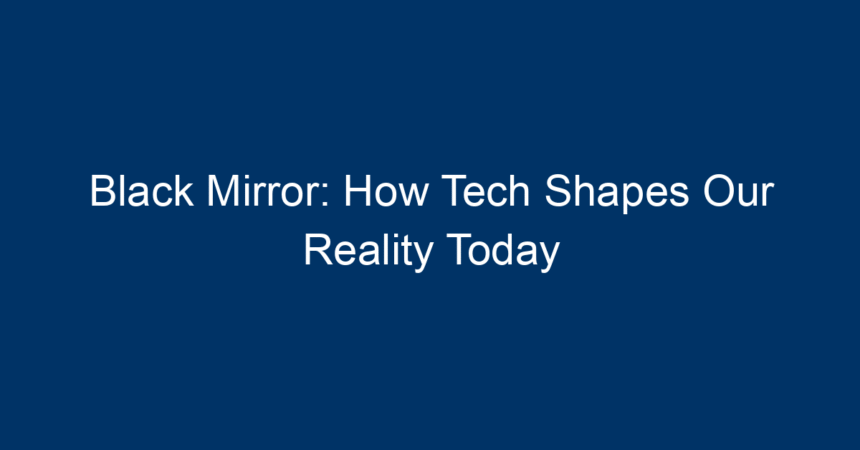Introduction
In a world increasingly influenced by technology, few television series have captured the imagination and fears of the public quite like Black Mirror. Created by Charlie Brooker, this anthology series delves into the dark corners of our relationship with technology, often presenting dystopian scenarios that feel uncomfortably close to reality. From virtual reality to social media manipulation, Black Mirror reflects the complexities of our modern lives, pushing us to question the moral implications of our technological advancements. In this article, we will explore how the themes of Black Mirror resonate with our daily experiences, shaping our understanding of reality today.
The Allure of Technology
The Double-Edged Sword
Technology is a double-edged sword, offering immense benefits while posing serious ethical questions. Episodes like "Nosedive" illustrate how social media can warp our perceptions of self-worth and relationships. In this episode, a woman’s social rating dictates her opportunities and interactions—a scenario increasingly plausible in our social media-dominated lives. As individuals curate their online personas, the quest for approval often masks deeper issues of identity and authenticity.
Virtual Reality and Escapism
Virtual reality (VR) has become a significant focus in Black Mirror. Episodes such as "USS Callister" paint a picture of how immersive technologies can provide exhilarating escapism but also raise ethical concerns about autonomy and consent. As VR systems become more advanced, we must consider where the line is drawn between enjoyable escapism and technology-induced addiction.
The Impact of Artificial Intelligence
Automation and Employment
The emergence of artificial intelligence (AI) is a recurring theme in Black Mirror. With episodes like "White Christmas," we confront the grim reality of AI’s potential to replace human jobs. The automation of work is no longer a distant threat; industries across the globe are already adapting to new technologies, leaving many workers vulnerable. The ethical implications of AI in the workplace demand immediate attention, as we face a future where job displacement is increasingly likely.
AI and Human Relationships
AI’s influence goes beyond the workplace, affecting personal relationships as well. In "Be Right Back," we see a woman replace her deceased partner with a synthetic version, which raises questions about grief, love, and what it means to be human. As AI continues to develop, we must navigate the complexities of relationships with machines, recognizing both the benefits and risks involved.
Surveillance and Privacy Concerns
The Surveillance State
In our hyper-connected world, privacy has become an increasingly rare commodity. Black Mirror explores this theme poignantly in episodes like "Fifteen Million Merits," where individuals live under constant surveillance and control. The unsettling portrayal of a future where privacy has all but vanished is particularly resonant in today’s society, prompting us to evaluate the trade-offs we make for convenience in our digital lives.
Data and Manipulation
The manipulation of data and personal information is another pressing concern. “The Entire History of You” looks at the consequences of being able to record and replay memories, showcasing how technology can exacerbate insecurities and obsession. As data breaches and targeted advertising become more common, consumers must become vigilant about their digital footprints and the implications of incessant data collection.
The Ethics of Digital Existence
Life After Death
Black Mirror often broaches the subject of digital immortality and its ethical ramifications, as seen in episodes like "San Junipero," where characters experience a form of everlasting life in a digital universe. This raises questions about the nature of existence: What happens to our essence in a digital afterlife? Are we merely our memories, or is there something more that technology cannot replicate? As discussions around digital identities and afterlives gain traction, we must reflect on our values and beliefs about existence and the afterlife.
The Role of Choice in Technology
Central to many Black Mirror episodes is the theme of choice—or the lack thereof. The series critiques how our dependence on technology can erode personal autonomy. For instance, the episode "Playtest" investigates the psychological toll of technology that knows our deepest fears and can manipulate them. In an era where algorithm-driven choices are prevalent in decisions ranging from what to watch next on Netflix to political leaning, we must ask ourselves: Are we truly choosing, or are we being guided by unseen hands?
The Influence of Social Media
The Digital Persona
Social media profoundly affects our identities, as depicted in Black Mirror episodes like "Nosedive." Platforms designed to connect us can often lead to isolation and anxiety, undermining genuine human interactions. The quest for likes and shares often results in superficial relationships and a distorted self-image. Understanding these dynamics can empower us to cultivate more meaningful connections, both online and offline.
Public Shaming and Cancel Culture
The phenomenon of public shaming, illustrated by "Shut Up and Dance," reflects the darker aspects of our online interactions. People can quickly become targets for mob justice, leading to devastating consequences. Reflecting on this dynamic can help us foster a culture of empathy and understanding, fostering a digital environment that supports healthy discourse rather than divisive behavior.
Conclusion: Taking Action in a Tech-Driven World
Black Mirror serves as a cautionary tale about the possibilities and perils of technological advancements. As we navigate this complex landscape, it is crucial to maintain awareness of the ethical implications of our choices, both as creators and consumers of technology. Here are some actionable insights for engaging responsibly with technology:
-
Prioritize Digital Well-being: Engage in regular digital detoxes to reconnect with the world around you and reduce anxiety related to social media.
-
Educate Yourself About Data Privacy: Understand how your data is collected and used. Use privacy settings to safeguard your information.
-
Foster Authentic Connections: Seek face-to-face interactions and invest time in meaningful relationships that go beyond virtual likes.
-
Critically Evaluate Technology’s Role: Before adopting new technologies, reflect on their impact on your life and society.
- Advocate for Ethical Tech Policies: Support initiatives and companies that prioritize ethical practices in technology development and data management.
By heeding these insights, we can harness technology’s power without sacrificing our humanity. The lessons from Black Mirror may seem dystopian, but they offer a path toward a more thoughtful and responsible tech-driven future.




